外研社八年级上册Module 5 Lao She Teahouse 整体大单元教学设计
文档属性
| 名称 | 外研社八年级上册Module 5 Lao She Teahouse 整体大单元教学设计 |
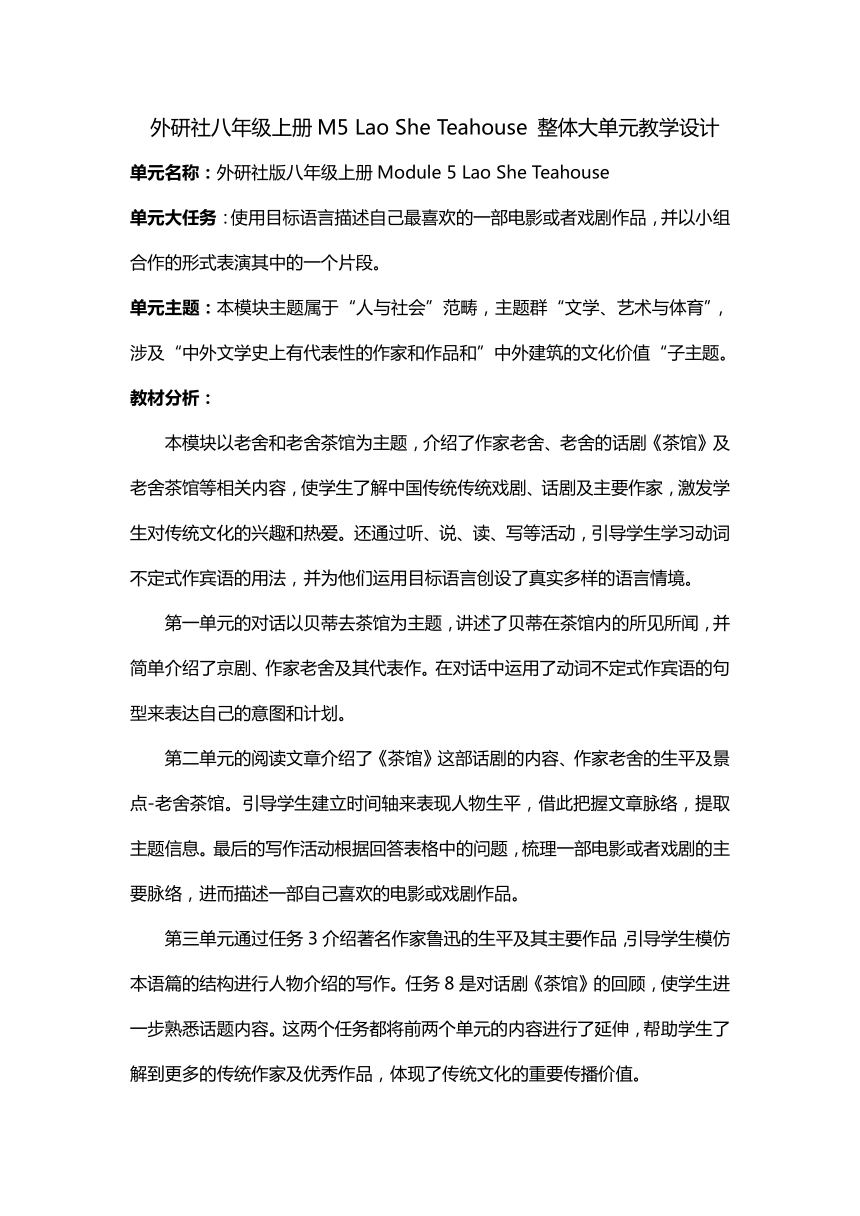
|
|
| 格式 | docx | ||
| 文件大小 | 214.0KB | ||
| 资源类型 | 教案 | ||
| 版本资源 | 外研版 | ||
| 科目 | 英语 | ||
| 更新时间 | 2023-10-11 00:00:00 | ||
图片预览

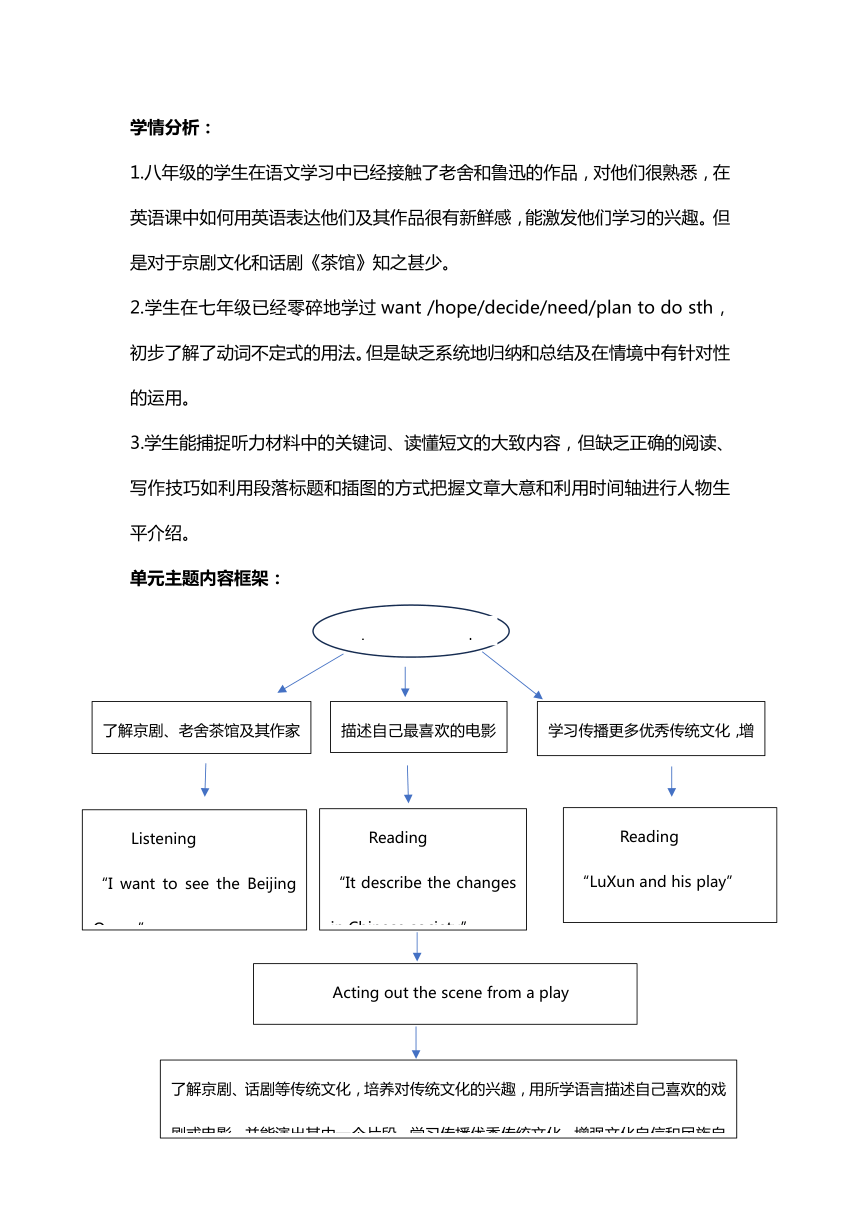
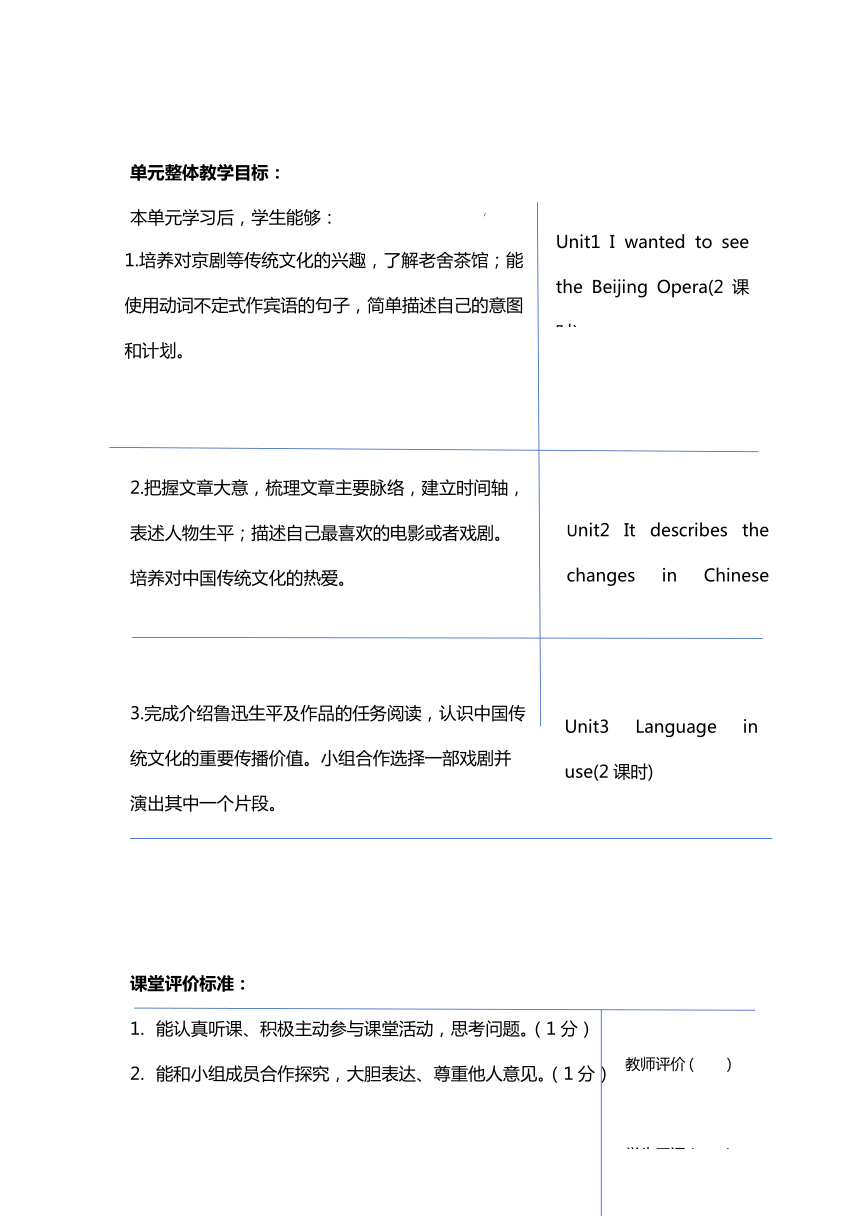
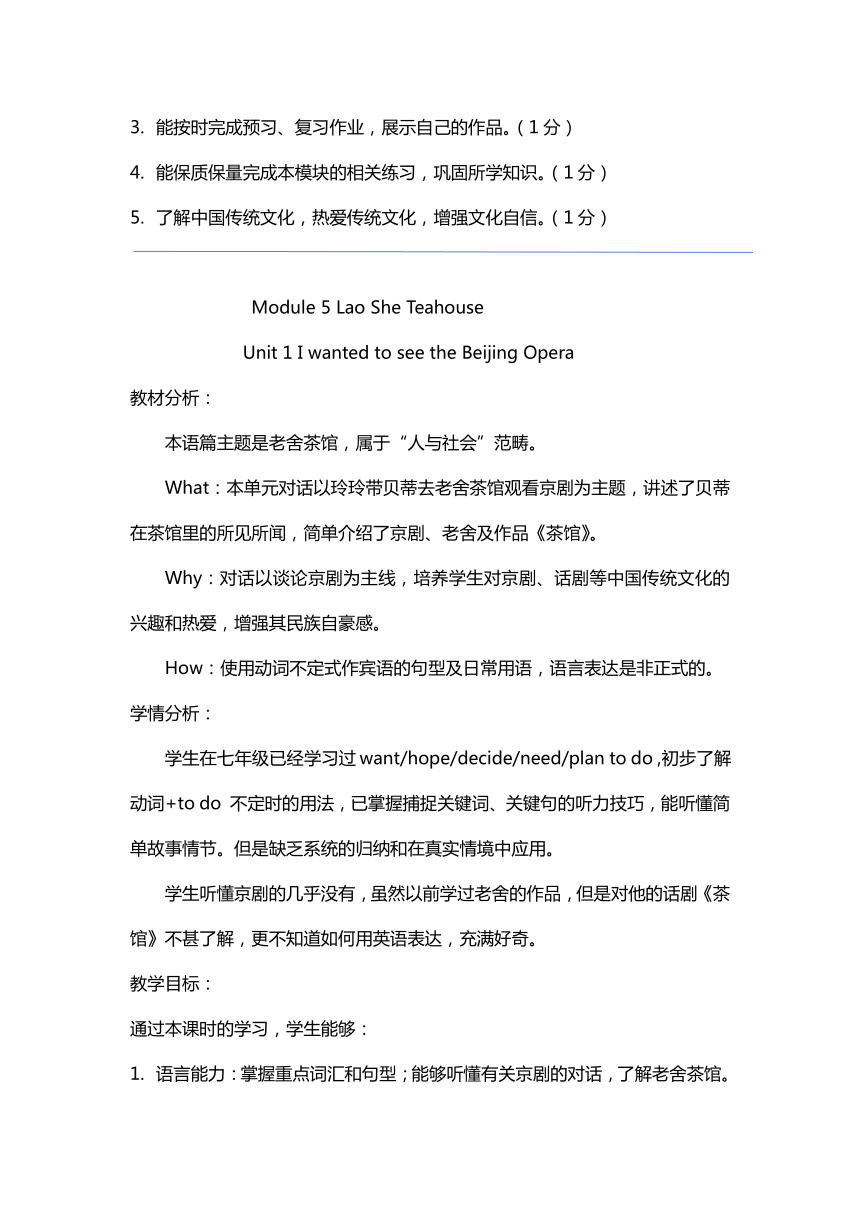
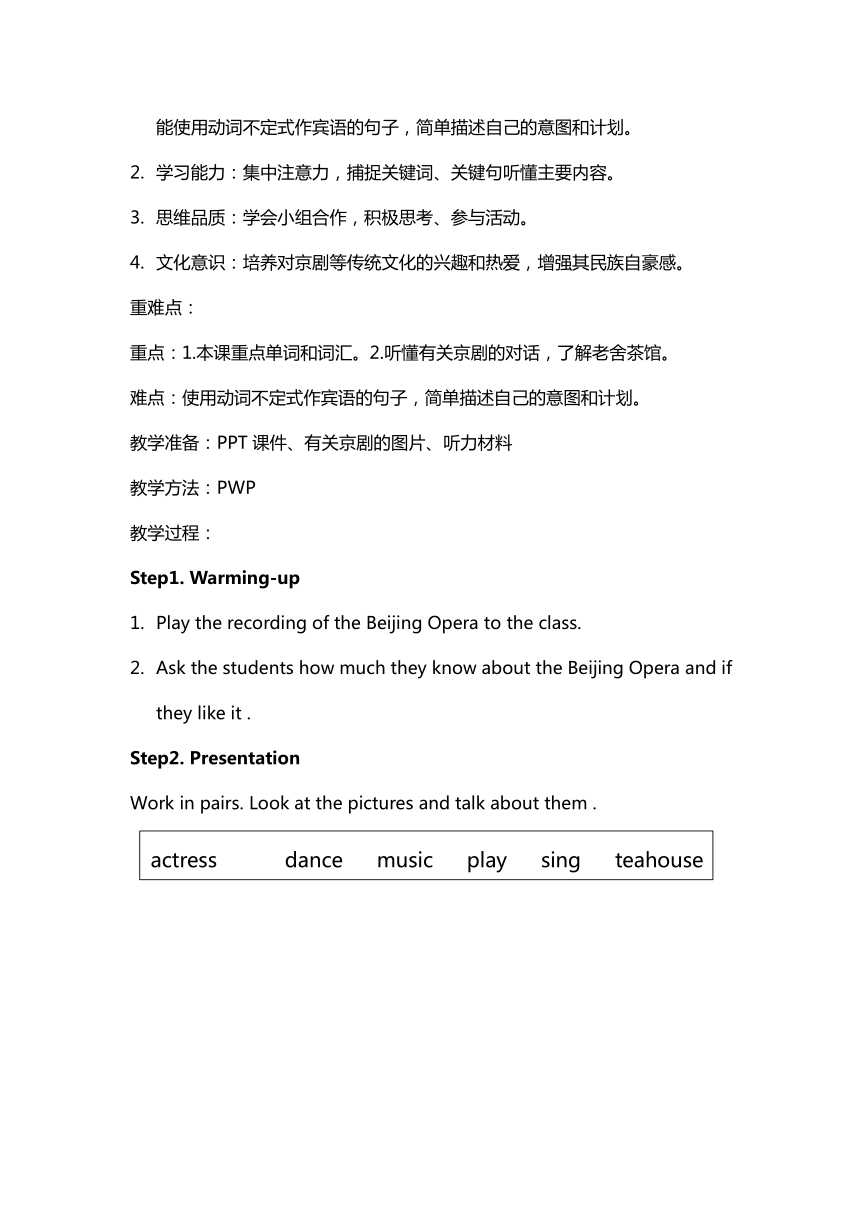
文档简介
外研社八年级上册M5 Lao She Teahouse 整体大单元教学设计
单元名称:外研社版八年级上册Module 5 Lao She Teahouse
单元大任务:使用目标语言描述自己最喜欢的一部电影或者戏剧作品,并以小组合作的形式表演其中的一个片段。
单元主题:本模块主题属于“人与社会”范畴,主题群“文学、艺术与体育”,涉及“中外文学史上有代表性的作家和作品和”中外建筑的文化价值“子主题。
教材分析:
本模块以老舍和老舍茶馆为主题,介绍了作家老舍、老舍的话剧《茶馆》及老舍茶馆等相关内容,使学生了解中国传统传统戏剧、话剧及主要作家,激发学生对传统文化的兴趣和热爱。还通过听、说、读、写等活动,引导学生学习动词不定式作宾语的用法,并为他们运用目标语言创设了真实多样的语言情境。
第一单元的对话以贝蒂去茶馆为主题,讲述了贝蒂在茶馆内的所见所闻,并简单介绍了京剧、作家老舍及其代表作。在对话中运用了动词不定式作宾语的句型来表达自己的意图和计划。
第二单元的阅读文章介绍了《茶馆》这部话剧的内容、作家老舍的生平及景点-老舍茶馆。引导学生建立时间轴来表现人物生平,借此把握文章脉络,提取主题信息。最后的写作活动根据回答表格中的问题,梳理一部电影或者戏剧的主要脉络,进而描述一部自己喜欢的电影或戏剧作品。
第三单元通过任务3介绍著名作家鲁迅的生平及其主要作品,引导学生模仿本语篇的结构进行人物介绍的写作。任务8是对话剧《茶馆》的回顾,使学生进一步熟悉话题内容。这两个任务都将前两个单元的内容进行了延伸,帮助学生了解到更多的传统作家及优秀作品,体现了传统文化的重要传播价值。
学情分析:
1.八年级的学生在语文学习中已经接触了老舍和鲁迅的作品,对他们很熟悉,在英语课中如何用英语表达他们及其作品很有新鲜感,能激发他们学习的兴趣。但是对于京剧文化和话剧《茶馆》知之甚少。
2.学生在七年级已经零碎地学过want /hope/decide/need/plan to do sth,初步了解了动词不定式的用法。但是缺乏系统地归纳和总结及在情境中有针对性的运用。
3.学生能捕捉听力材料中的关键词、读懂短文的大致内容,但缺乏正确的阅读、写作技巧如利用段落标题和插图的方式把握文章大意和利用时间轴进行人物生平介绍。
单元主题内容框架:
单元整体教学目标:
本单元学习后,学生能够:
2.把握文章大意,梳理文章主要脉络,建立时间轴,
表述人物生平;描述自己最喜欢的电影或者戏剧。
培养对中国传统文化的热爱。
3.完成介绍鲁迅生平及作品的任务阅读,认识中国传
统文化的重要传播价值。小组合作选择一部戏剧并
演出其中一个片段。
课堂评价标准:
能认真听课、积极主动参与课堂活动,思考问题。(1分)
能和小组成员合作探究,大胆表达、尊重他人意见。(1分)
能按时完成预习、复习作业,展示自己的作品。(1分)
能保质保量完成本模块的相关练习,巩固所学知识。(1分)
了解中国传统文化,热爱传统文化,增强文化自信。(1分)
Module 5 Lao She Teahouse
Unit 1 I wanted to see the Beijing Opera
教材分析:
本语篇主题是老舍茶馆,属于“人与社会”范畴。
What:本单元对话以玲玲带贝蒂去老舍茶馆观看京剧为主题,讲述了贝蒂在茶馆里的所见所闻,简单介绍了京剧、老舍及作品《茶馆》。
Why:对话以谈论京剧为主线,培养学生对京剧、话剧等中国传统文化的兴趣和热爱,增强其民族自豪感。
How:使用动词不定式作宾语的句型及日常用语,语言表达是非正式的。
学情分析:
学生在七年级已经学习过want/hope/decide/need/plan to do ,初步了解动词+to do 不定时的用法,已掌握捕捉关键词、关键句的听力技巧,能听懂简单故事情节。但是缺乏系统的归纳和在真实情境中应用。
学生听懂京剧的几乎没有,虽然以前学过老舍的作品,但是对他的话剧《茶馆》不甚了解,更不知道如何用英语表达,充满好奇。
教学目标:
通过本课时的学习,学生能够:
语言能力:掌握重点词汇和句型;能够听懂有关京剧的对话,了解老舍茶馆。能使用动词不定式作宾语的句子,简单描述自己的意图和计划。
学习能力:集中注意力,捕捉关键词、关键句听懂主要内容。
思维品质:学会小组合作,积极思考、参与活动。
文化意识:培养对京剧等传统文化的兴趣和热爱,增强其民族自豪感。
重难点:
重点:1.本课重点单词和词汇。2.听懂有关京剧的对话,了解老舍茶馆。
难点:使用动词不定式作宾语的句子,简单描述自己的意图和计划。
教学准备:PPT课件、有关京剧的图片、听力材料
教学方法:PWP
教学过程:
Step1. Warming-up
Play the recording of the Beijing Opera to the class.
Ask the students how much they know about the Beijing Opera and if they like it .
Step2. Presentation
Work in pairs. Look at the pictures and talk about them .
Ask the students to look at the pictures.
Read through the words and learn the new words ,make sure they know the meaning of all the words.
Ask them to describe the pictures in pairs.
Listen and underline the correct words or expressions. ( Activity2on page34) Check the answers and read the full sentences with the students.
Step3. While-listening
Play the recording and ask the students to check ( √ )the true sentences.
Listen again and try to get answers to the questions.
(1).who went to Lao She Teahouse last night
(2).Did Betty like the Beijing Opera
(3).How long did they plan to stay there
(4).Who is Lao She
Check the answers .
Step 4. Post-listening
Listen to the recording and read the conversation .
Role-play the conversation.
Learn the language points
(1). You know, I want to see the Beijing Opera, so Lingling offered to take me there.你知道,我想看京剧,因此玲玲主动提出带我去那儿。
Offer及物动词,意为“提议;提出”,offer to do sth 意为“主动提出做某事”。
She offered some useful advice.她提出一些有用的建议。
The children offered to help me do cleaning.孩子们主动提出帮助我打扫卫生。
(2).We only planned to watch for an hour, but in the end ,we stayed for three hours.我们计划只看一个小时,但最后我们待了三小时。
(3).I hope to understand more next time.我们希望下次能理解得多一点。
Hope 这里是动词,意为“希望”,常见用法有:hope to do sth 希望做某事;
Hope +(that)从句 希望……
We hope that you can have a good time in Hefei.我们希望你在合肥玩的开心。
(4).No idea.不知道。此处“no idea”是”I have no idea.”的缩写形式,意为“不知道”,相当于“I don’t know.”
____Excuse me, Is there a bookstore near here 打搅了,这附近有书店吗?
___ No idea, I am new here.不知道,我是新来的。
Complete the passage with the correct form of the words in the box. Check the answers from the whole class by reading the passage.
Read and predict which words in the answers the speaker is likely to stress. Play the recording for the students to listen and underline the stressed words.
Work in pairs. Read the conversations in Activity 5 aloud.
Tell the students to complete the sentences in Activity7 on their own. Read these sentences .
Read the example sentence in Activity8,work in pairs. Talk about something they ‘d like to do or see using infinitive as objiects.
___ I want to go to Xingjiang and ride horses.
Step5.Summary
Key words and key structures . Encourage students to talk what they learnd in this class.
Step6. Homework
1.Review the new words and expressions .
2.Review the conversation in unit1.
3.Write a short composition .My plan for this wenkend.(choose to do )
板书设计: module5 Lao She Teahouse
Unit 1. I wanted to see the Bejing Opera
want/ hope / plan /offer// to do sth 动词不定式作宾语
I wanted to see the Beijing Opera.
Linling offered to take me there.
教学反思:
Unit 2 It describes the changes in Chinese society.
教学目标:
通过本课时的学习,学生要求达到以下目标:
Linguistic ability:
To learn the new words and useful expressions .
To know the main idea of the passage about Lao She and his play Teahouse.
Learning capacity:
Under the main idea of a passage with the help of the paragraph headings and photos.
Record the sequence of events by the timeline .
Write a passage about a film or play followed by this text.
Thinking quality:Cooperative awareness and positive attitude
Cultural awareness :Be proud of our Chinese culture.
教学重难点:
重点:运用阅读策略获取信息,以时间轴的形式记录事件的发生顺序。
难点:运用所学知识描述和介绍自己所喜爱的戏剧或电影。
教学准备:PPT课件、图片
教学方法:PWP
教学过程:
Step1.warming -up
1.Play a fragment of the play Teahouse . Ask some questions:
What ‘s the name of the play
Who wrote it
Why is the play famous
2.Show a mind map about Lao She 、Teahouse and Lao She Teahouse.
Step2.Presentation
Introduce Lao She and his play Teahouse with the pictures.
Learn the new words. Read these words following the teacher.
Work in pairs. Ask and answer the questions .
Step3.while-reading
Skimming:
1.Look at the picture and guess what’s the passage mainly about
2.Read the passage and match the headings with the paragraphs.
Careful -readning
Reading the paragraph1 and check(√) the true sentences.
(1).Teahouse is one of Lao She’s most famous novels.( )
(2).The plays shows the lives of common people in China from the end of the nineteenth century to the end of the twentieth century.( )
(3).It tells us the story of WangLifa and his customers of his teahouse . ( √ )
Read the paragraph2 and complete the timeline with information about Lao She. Check the answers by joining these sentences .
Read the paragraph 3 and answer the questions:
(1).what can people do at Lao She Teahouse
(2).Do you think Lao She Teahouse is important for us why
Step 4 Post-reading
Fill in the blanks and retell the passage in Activity4.
Learn the language points.
.Teahouse is one of Lao She’s most famous plays.
《茶馆》是老舍最著名的剧作之一。
(2).He wrote many plays ,novels and short stories about people’s lives, and was named “the People’s Artist”.
他写了许多关于人们生活的话剧、小说和短篇故事,被誉为人民的艺术家。
Be named “被称为“。同义表达:be called.
(3).If you like the Beijing Opera ,traditional music or magic shows, you can enjoy them at the teahouse.如果你喜欢京剧、传统音乐或魔术,你能去这家茶馆欣赏表演。
(4).Lao She Teahouse gives a warm welcome to everyone from all over the world.老舍茶馆热烈欢迎来自世界各地的人们。
3.Complete the table in Activity 5 about their favourite play or film and learn the writing guide.
4. Write sentences about Teahouse with the information in Activity 5. T presents some tips first. Join the sentences then write a passage .
5.Then complete the table about their favourite play or film and write a passage about it.
Step 5. Summary
Step 6. Homework
Review the words and expressions we learnt today.
Finish your passage after school.
Find more information about Lao She Teahouse. ( choose to do )
板书设计:
Unit 2 It describes the changes in Chinese society.
century common if magic society
timeline :
born in Beijing
Lao She was born in Beijing in 1899.
教学反思:
Unit3 Language in use
教学目标
1.熟练掌握下列词汇和短语:offer ,end , at the end of ,want to do sth, plan to do dth
2.掌握并运用下列句型:
I wanted to see the Beijing Opera.
Lingling offered to take me there.
We only planned to watch for an hour.
I hope to understand more next time.
能够掌握动词不定式作宾语的用法。
能够运用目标语言表达自己的意图和计划。
了解更多中国优秀作家如鲁迅及其作品。
能够选一部剧的一个片段改编成短剧并表演。
教学重难点
重点:1.本模块重点词汇和句型。2. 掌握动词不定式的用法。
难点:Acting out a scene from a play
教学准备
PPT课件、教学图片等
教学过程
Step1. Revision
1.Read through the example sentences in the box ,review the use of the infinitives as objects.
2.Summarize and consolidate the use of infinitives as objiects by some exercises.
常见动词不定式作宾语的动词:need, refuse ,forget, want ,learn, try, like, agree, decide, start ……
Step2. Pratice
1.complete the sentence with the correct form of the words in the box.
(1),We decide _________________at home because it was raining.
(2).Lao She started_______ Chinese in London in 1924.
(3).I tried_______ poems.
(4).They plan ___________ a film tomorrow.
(5).I want_ _____ my holiday in Beijing.
Check the answers ,read these sentences aloud.
Read the conversation and complete the note with the correct form of the words in the box.
Betty (1)______to see the Beijing Opera again. Lingling (2)___________to take her. Daming(3)______them to go to Mei Lanfang Theatre .Lingling (4)________to go next Saturday.
Step3.Reading and complete
1.Show Luxun’s picture and ask the students:
Who is he
What do you know about him
2.Read the passage and get the main idea . then fill in the blanks with the correct form of the words in brackets. Check the answers .
Read the passage again. Ask the students to think: Why do you think lu Xun is respected by Chinese people
Step4.listening
Listen and choose the corret answer in Activity 5.
Listen again and check (√) the true sentences.
Read the passage and choose the correct answer about Review of Teahouse in Activity8.
Step 5. Grammar
Work in pairs. Talk about your weekend plans. Use the words and expressions in the box to help you .
___I want to see the Bejing Opera
____Why don’t we…
Step6.Module task
work in groups .Find a play. Think about these questions.
Where does it take place
Who is in it
What is the story
What are the special moments in it
Choose a scene and practice it . Then act out the scene in front of the class.
Step7.Summary
Step8 Homework
Review the new words and expressions in this Module.
Finish the exercises in this module.
Find out more information about Lu Xun and his famous books . (choose to do)
板书设计:
Unit3 language in use
动词不定式作宾语: want/offer/plan / hope /decide/to do sth ……
动词不定式做双宾语:advise sb to do sth 建议某人做某事
Lu Xun is one of the greatest writers of modern China.
教学反思:
单元名称:外研社版八年级上册Module 5 Lao She Teahouse
单元大任务:使用目标语言描述自己最喜欢的一部电影或者戏剧作品,并以小组合作的形式表演其中的一个片段。
单元主题:本模块主题属于“人与社会”范畴,主题群“文学、艺术与体育”,涉及“中外文学史上有代表性的作家和作品和”中外建筑的文化价值“子主题。
教材分析:
本模块以老舍和老舍茶馆为主题,介绍了作家老舍、老舍的话剧《茶馆》及老舍茶馆等相关内容,使学生了解中国传统传统戏剧、话剧及主要作家,激发学生对传统文化的兴趣和热爱。还通过听、说、读、写等活动,引导学生学习动词不定式作宾语的用法,并为他们运用目标语言创设了真实多样的语言情境。
第一单元的对话以贝蒂去茶馆为主题,讲述了贝蒂在茶馆内的所见所闻,并简单介绍了京剧、作家老舍及其代表作。在对话中运用了动词不定式作宾语的句型来表达自己的意图和计划。
第二单元的阅读文章介绍了《茶馆》这部话剧的内容、作家老舍的生平及景点-老舍茶馆。引导学生建立时间轴来表现人物生平,借此把握文章脉络,提取主题信息。最后的写作活动根据回答表格中的问题,梳理一部电影或者戏剧的主要脉络,进而描述一部自己喜欢的电影或戏剧作品。
第三单元通过任务3介绍著名作家鲁迅的生平及其主要作品,引导学生模仿本语篇的结构进行人物介绍的写作。任务8是对话剧《茶馆》的回顾,使学生进一步熟悉话题内容。这两个任务都将前两个单元的内容进行了延伸,帮助学生了解到更多的传统作家及优秀作品,体现了传统文化的重要传播价值。
学情分析:
1.八年级的学生在语文学习中已经接触了老舍和鲁迅的作品,对他们很熟悉,在英语课中如何用英语表达他们及其作品很有新鲜感,能激发他们学习的兴趣。但是对于京剧文化和话剧《茶馆》知之甚少。
2.学生在七年级已经零碎地学过want /hope/decide/need/plan to do sth,初步了解了动词不定式的用法。但是缺乏系统地归纳和总结及在情境中有针对性的运用。
3.学生能捕捉听力材料中的关键词、读懂短文的大致内容,但缺乏正确的阅读、写作技巧如利用段落标题和插图的方式把握文章大意和利用时间轴进行人物生平介绍。
单元主题内容框架:
单元整体教学目标:
本单元学习后,学生能够:
2.把握文章大意,梳理文章主要脉络,建立时间轴,
表述人物生平;描述自己最喜欢的电影或者戏剧。
培养对中国传统文化的热爱。
3.完成介绍鲁迅生平及作品的任务阅读,认识中国传
统文化的重要传播价值。小组合作选择一部戏剧并
演出其中一个片段。
课堂评价标准:
能认真听课、积极主动参与课堂活动,思考问题。(1分)
能和小组成员合作探究,大胆表达、尊重他人意见。(1分)
能按时完成预习、复习作业,展示自己的作品。(1分)
能保质保量完成本模块的相关练习,巩固所学知识。(1分)
了解中国传统文化,热爱传统文化,增强文化自信。(1分)
Module 5 Lao She Teahouse
Unit 1 I wanted to see the Beijing Opera
教材分析:
本语篇主题是老舍茶馆,属于“人与社会”范畴。
What:本单元对话以玲玲带贝蒂去老舍茶馆观看京剧为主题,讲述了贝蒂在茶馆里的所见所闻,简单介绍了京剧、老舍及作品《茶馆》。
Why:对话以谈论京剧为主线,培养学生对京剧、话剧等中国传统文化的兴趣和热爱,增强其民族自豪感。
How:使用动词不定式作宾语的句型及日常用语,语言表达是非正式的。
学情分析:
学生在七年级已经学习过want/hope/decide/need/plan to do ,初步了解动词+to do 不定时的用法,已掌握捕捉关键词、关键句的听力技巧,能听懂简单故事情节。但是缺乏系统的归纳和在真实情境中应用。
学生听懂京剧的几乎没有,虽然以前学过老舍的作品,但是对他的话剧《茶馆》不甚了解,更不知道如何用英语表达,充满好奇。
教学目标:
通过本课时的学习,学生能够:
语言能力:掌握重点词汇和句型;能够听懂有关京剧的对话,了解老舍茶馆。能使用动词不定式作宾语的句子,简单描述自己的意图和计划。
学习能力:集中注意力,捕捉关键词、关键句听懂主要内容。
思维品质:学会小组合作,积极思考、参与活动。
文化意识:培养对京剧等传统文化的兴趣和热爱,增强其民族自豪感。
重难点:
重点:1.本课重点单词和词汇。2.听懂有关京剧的对话,了解老舍茶馆。
难点:使用动词不定式作宾语的句子,简单描述自己的意图和计划。
教学准备:PPT课件、有关京剧的图片、听力材料
教学方法:PWP
教学过程:
Step1. Warming-up
Play the recording of the Beijing Opera to the class.
Ask the students how much they know about the Beijing Opera and if they like it .
Step2. Presentation
Work in pairs. Look at the pictures and talk about them .
Ask the students to look at the pictures.
Read through the words and learn the new words ,make sure they know the meaning of all the words.
Ask them to describe the pictures in pairs.
Listen and underline the correct words or expressions. ( Activity2on page34) Check the answers and read the full sentences with the students.
Step3. While-listening
Play the recording and ask the students to check ( √ )the true sentences.
Listen again and try to get answers to the questions.
(1).who went to Lao She Teahouse last night
(2).Did Betty like the Beijing Opera
(3).How long did they plan to stay there
(4).Who is Lao She
Check the answers .
Step 4. Post-listening
Listen to the recording and read the conversation .
Role-play the conversation.
Learn the language points
(1). You know, I want to see the Beijing Opera, so Lingling offered to take me there.你知道,我想看京剧,因此玲玲主动提出带我去那儿。
Offer及物动词,意为“提议;提出”,offer to do sth 意为“主动提出做某事”。
She offered some useful advice.她提出一些有用的建议。
The children offered to help me do cleaning.孩子们主动提出帮助我打扫卫生。
(2).We only planned to watch for an hour, but in the end ,we stayed for three hours.我们计划只看一个小时,但最后我们待了三小时。
(3).I hope to understand more next time.我们希望下次能理解得多一点。
Hope 这里是动词,意为“希望”,常见用法有:hope to do sth 希望做某事;
Hope +(that)从句 希望……
We hope that you can have a good time in Hefei.我们希望你在合肥玩的开心。
(4).No idea.不知道。此处“no idea”是”I have no idea.”的缩写形式,意为“不知道”,相当于“I don’t know.”
____Excuse me, Is there a bookstore near here 打搅了,这附近有书店吗?
___ No idea, I am new here.不知道,我是新来的。
Complete the passage with the correct form of the words in the box. Check the answers from the whole class by reading the passage.
Read and predict which words in the answers the speaker is likely to stress. Play the recording for the students to listen and underline the stressed words.
Work in pairs. Read the conversations in Activity 5 aloud.
Tell the students to complete the sentences in Activity7 on their own. Read these sentences .
Read the example sentence in Activity8,work in pairs. Talk about something they ‘d like to do or see using infinitive as objiects.
___ I want to go to Xingjiang and ride horses.
Step5.Summary
Key words and key structures . Encourage students to talk what they learnd in this class.
Step6. Homework
1.Review the new words and expressions .
2.Review the conversation in unit1.
3.Write a short composition .My plan for this wenkend.(choose to do )
板书设计: module5 Lao She Teahouse
Unit 1. I wanted to see the Bejing Opera
want/ hope / plan /offer// to do sth 动词不定式作宾语
I wanted to see the Beijing Opera.
Linling offered to take me there.
教学反思:
Unit 2 It describes the changes in Chinese society.
教学目标:
通过本课时的学习,学生要求达到以下目标:
Linguistic ability:
To learn the new words and useful expressions .
To know the main idea of the passage about Lao She and his play Teahouse.
Learning capacity:
Under the main idea of a passage with the help of the paragraph headings and photos.
Record the sequence of events by the timeline .
Write a passage about a film or play followed by this text.
Thinking quality:Cooperative awareness and positive attitude
Cultural awareness :Be proud of our Chinese culture.
教学重难点:
重点:运用阅读策略获取信息,以时间轴的形式记录事件的发生顺序。
难点:运用所学知识描述和介绍自己所喜爱的戏剧或电影。
教学准备:PPT课件、图片
教学方法:PWP
教学过程:
Step1.warming -up
1.Play a fragment of the play Teahouse . Ask some questions:
What ‘s the name of the play
Who wrote it
Why is the play famous
2.Show a mind map about Lao She 、Teahouse and Lao She Teahouse.
Step2.Presentation
Introduce Lao She and his play Teahouse with the pictures.
Learn the new words. Read these words following the teacher.
Work in pairs. Ask and answer the questions .
Step3.while-reading
Skimming:
1.Look at the picture and guess what’s the passage mainly about
2.Read the passage and match the headings with the paragraphs.
Careful -readning
Reading the paragraph1 and check(√) the true sentences.
(1).Teahouse is one of Lao She’s most famous novels.( )
(2).The plays shows the lives of common people in China from the end of the nineteenth century to the end of the twentieth century.( )
(3).It tells us the story of WangLifa and his customers of his teahouse . ( √ )
Read the paragraph2 and complete the timeline with information about Lao She. Check the answers by joining these sentences .
Read the paragraph 3 and answer the questions:
(1).what can people do at Lao She Teahouse
(2).Do you think Lao She Teahouse is important for us why
Step 4 Post-reading
Fill in the blanks and retell the passage in Activity4.
Learn the language points.
.Teahouse is one of Lao She’s most famous plays.
《茶馆》是老舍最著名的剧作之一。
(2).He wrote many plays ,novels and short stories about people’s lives, and was named “the People’s Artist”.
他写了许多关于人们生活的话剧、小说和短篇故事,被誉为人民的艺术家。
Be named “被称为“。同义表达:be called.
(3).If you like the Beijing Opera ,traditional music or magic shows, you can enjoy them at the teahouse.如果你喜欢京剧、传统音乐或魔术,你能去这家茶馆欣赏表演。
(4).Lao She Teahouse gives a warm welcome to everyone from all over the world.老舍茶馆热烈欢迎来自世界各地的人们。
3.Complete the table in Activity 5 about their favourite play or film and learn the writing guide.
4. Write sentences about Teahouse with the information in Activity 5. T presents some tips first. Join the sentences then write a passage .
5.Then complete the table about their favourite play or film and write a passage about it.
Step 5. Summary
Step 6. Homework
Review the words and expressions we learnt today.
Finish your passage after school.
Find more information about Lao She Teahouse. ( choose to do )
板书设计:
Unit 2 It describes the changes in Chinese society.
century common if magic society
timeline :
born in Beijing
Lao She was born in Beijing in 1899.
教学反思:
Unit3 Language in use
教学目标
1.熟练掌握下列词汇和短语:offer ,end , at the end of ,want to do sth, plan to do dth
2.掌握并运用下列句型:
I wanted to see the Beijing Opera.
Lingling offered to take me there.
We only planned to watch for an hour.
I hope to understand more next time.
能够掌握动词不定式作宾语的用法。
能够运用目标语言表达自己的意图和计划。
了解更多中国优秀作家如鲁迅及其作品。
能够选一部剧的一个片段改编成短剧并表演。
教学重难点
重点:1.本模块重点词汇和句型。2. 掌握动词不定式的用法。
难点:Acting out a scene from a play
教学准备
PPT课件、教学图片等
教学过程
Step1. Revision
1.Read through the example sentences in the box ,review the use of the infinitives as objects.
2.Summarize and consolidate the use of infinitives as objiects by some exercises.
常见动词不定式作宾语的动词:need, refuse ,forget, want ,learn, try, like, agree, decide, start ……
Step2. Pratice
1.complete the sentence with the correct form of the words in the box.
(1),We decide _________________at home because it was raining.
(2).Lao She started_______ Chinese in London in 1924.
(3).I tried_______ poems.
(4).They plan ___________ a film tomorrow.
(5).I want_ _____ my holiday in Beijing.
Check the answers ,read these sentences aloud.
Read the conversation and complete the note with the correct form of the words in the box.
Betty (1)______to see the Beijing Opera again. Lingling (2)___________to take her. Daming(3)______them to go to Mei Lanfang Theatre .Lingling (4)________to go next Saturday.
Step3.Reading and complete
1.Show Luxun’s picture and ask the students:
Who is he
What do you know about him
2.Read the passage and get the main idea . then fill in the blanks with the correct form of the words in brackets. Check the answers .
Read the passage again. Ask the students to think: Why do you think lu Xun is respected by Chinese people
Step4.listening
Listen and choose the corret answer in Activity 5.
Listen again and check (√) the true sentences.
Read the passage and choose the correct answer about Review of Teahouse in Activity8.
Step 5. Grammar
Work in pairs. Talk about your weekend plans. Use the words and expressions in the box to help you .
___I want to see the Bejing Opera
____Why don’t we…
Step6.Module task
work in groups .Find a play. Think about these questions.
Where does it take place
Who is in it
What is the story
What are the special moments in it
Choose a scene and practice it . Then act out the scene in front of the class.
Step7.Summary
Step8 Homework
Review the new words and expressions in this Module.
Finish the exercises in this module.
Find out more information about Lu Xun and his famous books . (choose to do)
板书设计:
Unit3 language in use
动词不定式作宾语: want/offer/plan / hope /decide/to do sth ……
动词不定式做双宾语:advise sb to do sth 建议某人做某事
Lu Xun is one of the greatest writers of modern China.
教学反思:
同课章节目录
- Module 1 How to learn English
- Unit 1 Let's try to speak English as much as possi
- Unit 2 You should smile at her.
- Unit 3 Language in use .
- Module 2 My home town and my country
- Unit 1 It's taller than many other buildings.
- Unit 2 Cambridge is a beautiful city in the east o
- Unit 3 Language in use .
- Module 3 Sports.
- Unit 1 Nothing is more exciting than playing tenni
- Unit 2 This year we training more carefully.
- Unit 3 Language in use .
- Module 4 Planes, ships and trains .
- Unit 1 He lives the farthest from school.
- Unit 2 What is the best way to travel.
- Unit 3 Language in use .
- Module 5 Lao She Teahouse.
- Unit 1 I wanted to see the Beijing Opera.
- Unit 2 It descibes the changes in Chinese society.
- Unit 3 Language in use .
- Module 6 Animals in danger.
- Unit 1 It allows people to get closer to them .
- Unit 2 The WWF is working hard to save them all.
- Unit 3 Language in use .
- Revision module A
- Module 7 A famous story
- Unit 1 Alice was sitting with her sister by the ri
- Unit 2 She was thinking about her cat.
- Unit 3 Language in use .
- Module 8 Accidents
- Unit 1 While the car were changing to red, a car s
- Unit 2 I was trying to pick it up when it bite me
- Unit 3 Language in use .
- Module 9 Population
- Unit 1 The population of China is about 1.37 billi
- Unit 2 Arnwick was a city with 200,000 people.
- Unit 3 Language in use .
- Module 10 The weathe
- Unit 1 It might snow.
- Unit 2 The weather is fine all year round.
- Unit 3 Language in use .
- Module 11 Way of life
- Unit 1 In China ,we open a gift later.
- Unit 2 In England, you usually drink tea with milk
- Unit 3 Language in use .
- Module 12 Help
- Unit 1 What should we do before help arrives?
- Unit 2 Stay away from windows and heavy furniture.
- Unit 3 Language in use .
- Revision module B
